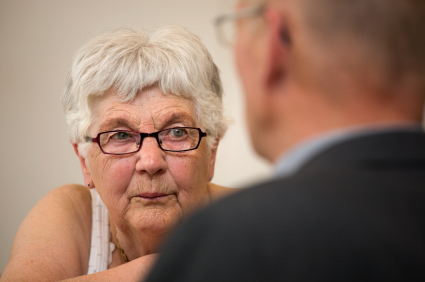 Editors’ Note: A recent New York Times article on the benefits of psychotherapy for the elderly generated a lot of discussion. It led us to wonder: What benefits might such therapy have, not only for the elderly who seek it, but also for their caregivers and families? Geriatric psychiatrist Gary Kennedy shares his thoughts.
Editors’ Note: A recent New York Times article on the benefits of psychotherapy for the elderly generated a lot of discussion. It led us to wonder: What benefits might such therapy have, not only for the elderly who seek it, but also for their caregivers and families? Geriatric psychiatrist Gary Kennedy shares his thoughts.
Can psychotherapy really help older adults and their caregivers? And if so, how? Even more important: Why bother, when there is so little time left at the end of one’s life? Will the time and effort, not to mention the expense, be worthwhile?
In considering psychotherapy for older adults, let’s first dispense with the “can’t teach an old dog new tricks” prejudice. Freud may have been right that mental elasticity—more accurately, mental speed and reaction time—declines with age. But the ability to learn does not, provided the motivation to expend the effort is there. And motivation changes with age. Life satisfaction, sustaining one’s independence, staying related in the time left are motivators that are more important for older adults than for younger people, who tend to focus on achievement, recognition, acquisition, and creating the next generation.
If the motivation is present, then the capacity to learn means that psychotherapy can help older people as well as the people who care for them. The following case clearly illustrates the benefits and follow-on effects.
My patient had a traumatic childhood and a contentious but loving relationship with her son. Both were prone to arguments, but through therapy my patient learned how to avoid provoking a fight. She also learned how to avoid becoming depressed as a result of fights with her son.
She does not love her son any less now; she is just more realistic in her expectations of him. Avoiding depression helps her sustain her independence, despite her advanced age, and keep stable relationships with her son and grandsons—to everyone’s benefit.
Much of her therapy revolved around recalling the past, her parents, and her deceased husband, but it also explored how she had adjusted and how she had overcome misfortune to have a family she is proud of and that genuinely cares for her, even if not exactly in the way she might want. Her resilience is inspiring. That is one of the best-kept secrets about psychotherapy with older adults. They have lessons to teach, and can be living examples of how to age with grace—even how to confront death calmly and directly.
This is not to say the golden years are always free of pain, bitterness, and despair. Depression and dementia impair too many older Americans, and neither psychotherapy nor medications are as accessible or effective as we would hope. But for those older adults motivated to examine their feelings, consider their perspectives, act on their problems, and learn, psychotherapy can be extremely useful—to the patients themselves and to those who care for them.


Comments on this entry are closed.
At 82 years and progressing along the experience of aging, I find the idea of learning how to adjust one’s
thinking is quite interesting! I totally agree that resilience is the key to having happy days even when we
feel like pulling the plug. I pray every day to be a blessing, no matter how small, in the life of someone else.
It is amazing how many elderly people never see a smile, feel a soft touch of a hand, or hear a kind word., I am
a firm believer that we can all learn something about age and respect for our fellow man! We can be givers of
psycotherapy if we see the other person, especially the elderly, as someone beautiful!
Hello Gary,
Although I’m not medically inclined, I work with the elderly and have been searching for ways to help some of them see that there’s still something left they can offer they younger generation. Rather than simply ‘sitting there and waiting’ for death, literally. I really get disappointed how, sometimes, the younger generation treat the older folk – no show of affection. I believe with a little bit of learning and education, like reading your article, we can be more tender towards our senior citizens because they’ve still got stuff to teach us.
It’s said that beauty lies in the eyes of the beholder so if we see our elderly folk as being beautiful, we can show them some love. Just like you said, there is no guarantee that older years are pain free, stress-free and all that, but we can certainly help make the pain and stress less damaging on our elderly if we showed love.
Thanks for a great article.